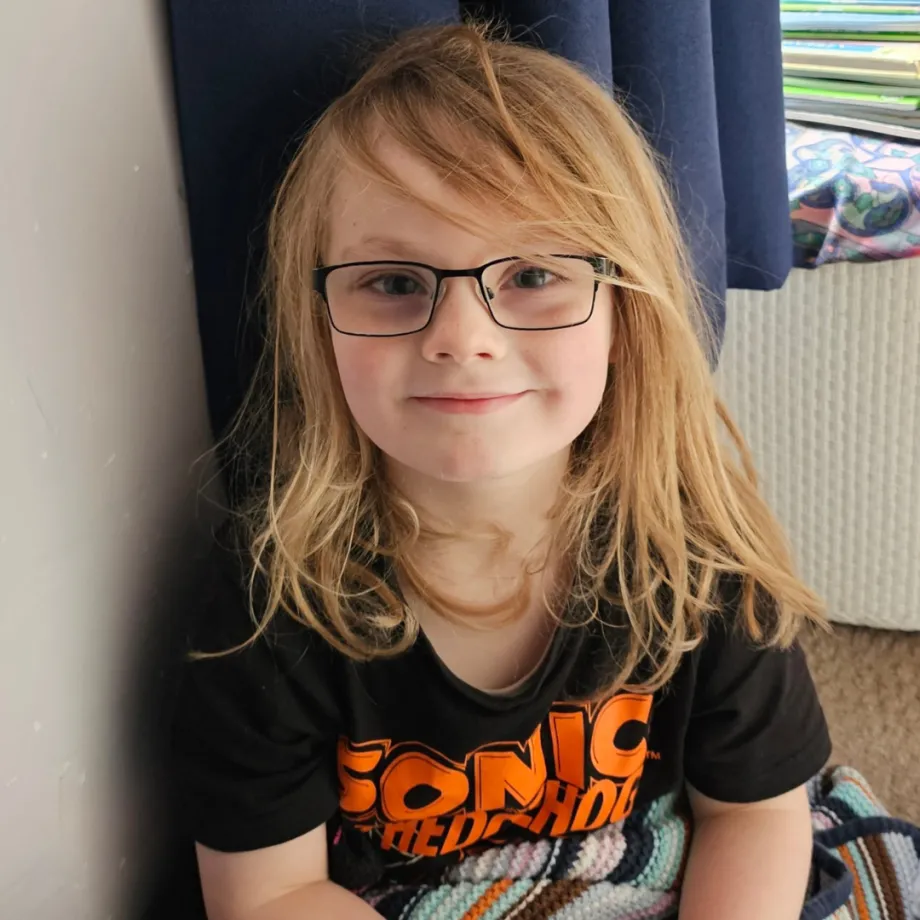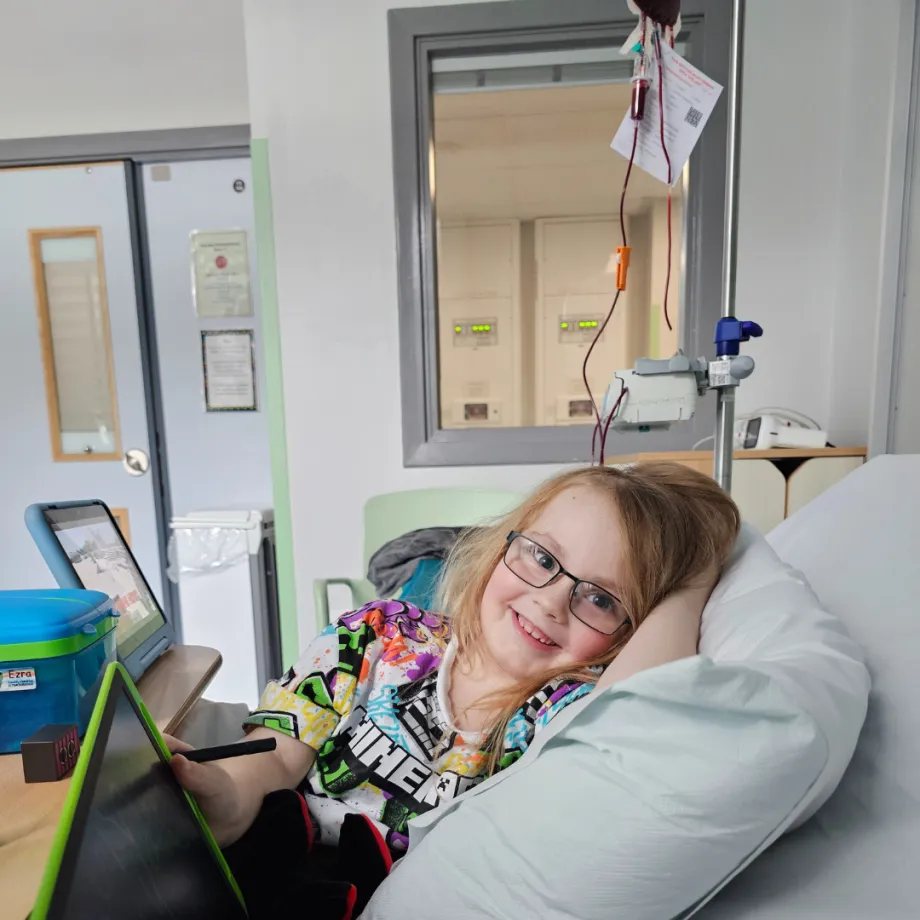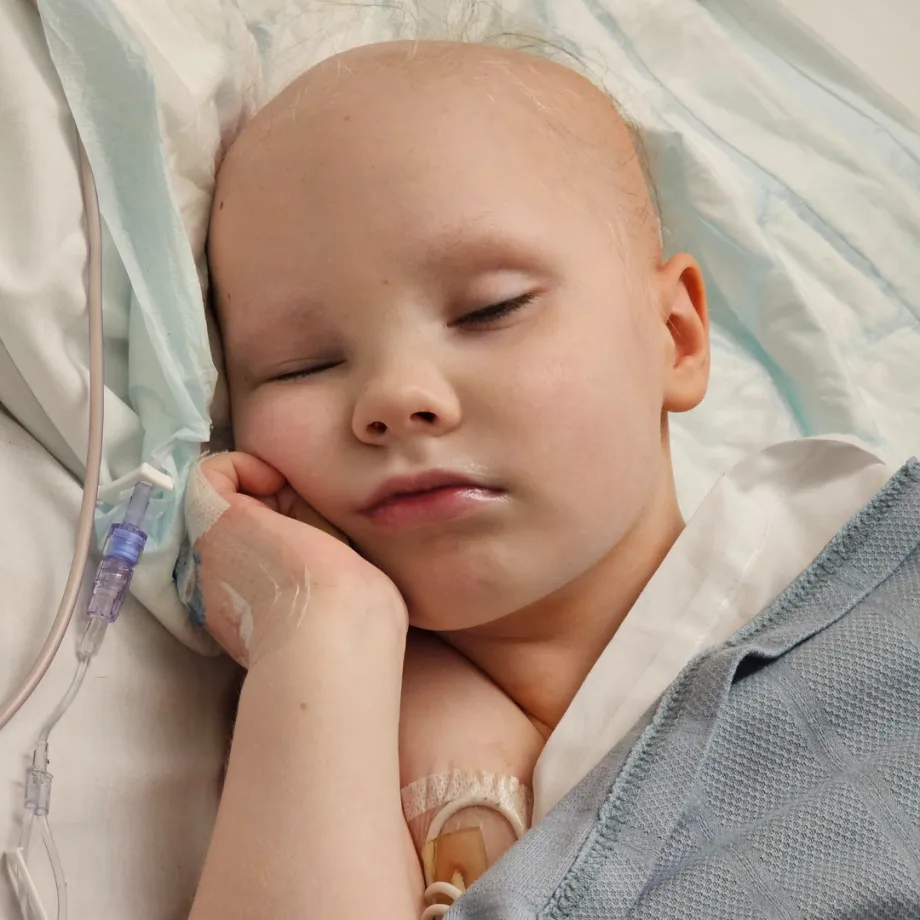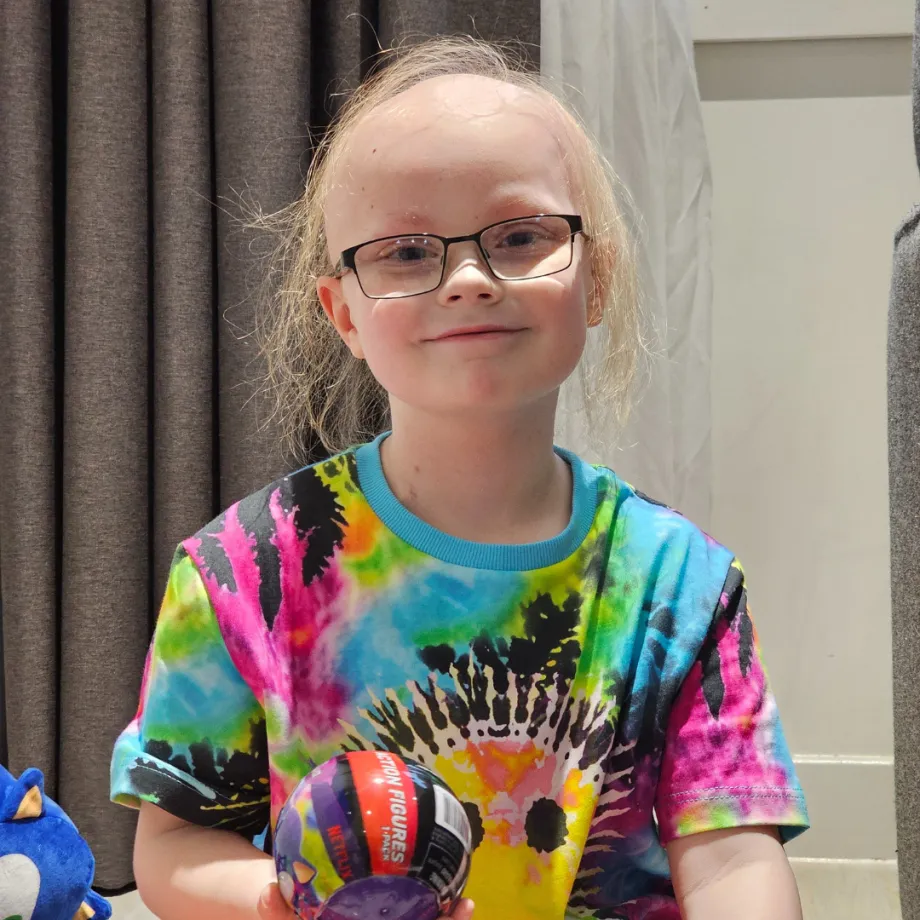Before Ezra’s diagnosis, he was under the care of our local hospital, due to wearing glasses and having a 'lazy eye'. He’d been given a new pair of glasses as his prescription had improved. But, around two weeks after receiving the new glasses, he mentioned he had a headache. This went away on its own, but he then mentioned a headache again the following week.

Ezra before diagnosis
We’d received a letter from the hospital with a date to check how he was getting on with his new prescription, so I assumed the headaches may be linked to the new glasses. However, the headaches became more frequent, and he began having them roughly twice a week. He also sometimes felt sick when he woke up, though this wasn’t every day and usually went away on its own.
His dad took him for the eye appointment at the hospital, where he did terribly reading the letter board. The hospital said they would refer him for another appointment to reassess the prescription.
Two weeks later, I took Ezra for that appointment at 1:30 pm. That day, he could not read the board, and everything was wrong. The doctor looked in his eyes and straight away referred us to paediatrics, due to a swollen optic nerve. We were taken to the ward by a porter.
I spoke to the consultant on the ward, who asked me lots of questions: "Has he had headaches?" "Has he been sick or lost weight?" "Is he more clumsy than usual?" I answered yes to everything.
She sent him for an MRI scan at 5:30 pm. As soon as we were back on the ward, I was told he had a brain tumour, and we'd be transferred to Alder Hey Children's Hospital as soon as the ambulance arrived.
Ezra was admitted to the neurology high dependency unit and had surgery the next morning to release the pressure on his brain. He then had surgery to remove the tumour four days later. It didn't cross my mind that this was cancer until after surgery, when the surgeon said he thought it was malignant.
Unfortunately, he developed a blood clot in his brain. He had emergency surgery four days after the tumour removal to insert an external ventricular drainage (EVD), to help drain cerebrospinal fluid from the ventricles in the brain. During this time, we were told the tumour was medulloblastoma Group 3, large cell anaplastic, MYC amplified, and had spread to his spine and cerebrospinal fluid (CSF). This has a poor prognosis. Once the EVD was removed, he had a VP shunt inserted, and chemotherapy then began.
Ezra’s treatment and further surgeries
Ezra had two rounds of chemotherapy before we were told he’d relapsed, and that he needed to start radiotherapy as soon as possible. Just a few days later, he was having planning scans at the Christie Proton Beam Centre in Manchester. He then had 30 rounds of proton beam therapy, which was done under general anaesthetic five days a week for six weeks.

Ezra in hospital
Five weeks after finishing radiotherapy, his shunt blocked. He was admitted to intensive care and underwent emergency surgery the same evening. Unfortunately, that didn’t work, and he had further surgery two days later to remove his shunt and put an EVD in again. He had developed low-pressure hydrocephalus and spent five weeks in hospital.
During this time, we were told they’d discovered a new mass in the third ventricle, and they believed it to be metastatic disease. Chemotherapy started again, he contracted shingles and had another surgery to reinsert his VP shunt before going home just in time for Christmas.

Ezra in hospital
We were home for just a few days for Christmas before Ezra had three more rounds of chemotherapy. After the third round, he developed an infection and stomach pain.
After a lot of back and forth between neurology and oncology, it was discovered he had an infection in his shunt. He again had surgery to remove it and insert an EVD. Two days later, he developed a blood clot that blocked the EVD and had yet another surgery to insert an EVD in a different part of his brain.
He eventually had his VP shunt put back in, the EVD removed, and his fourth round of chemotherapy, taking his hospital stay to six weeks. Treatment ended at the end of March 2025. His scans are currently stable, although there are concerns with one of the relapse areas showing possible growth and bright areas on his spine.
Ezra’s at high risk of relapse or secondary cancers. We just try to live day by day. The best we can hope for is stable scans.
The impact of Ezra’s diagnosis and treatment
The impact on our family has been immense. We have two children, who were five and six at the time of diagnosis. It was extremely hard for our younger son, who spent most of the time at home with dad, while I was in hospital with his brother. We went from never spending a night apart to not seeing each other for over a week. The stress and anxiety are never ending. I find myself second guessing every tiny thing in case it's a sign that we need to go to the hospital.
Ezra missed almost a full year of school due to treatment and the complications that arose. His appearance has significantly changed, too. He had waist length blonde hair before treatment. This has had a significant impact on his self-esteem and confidence.
He struggles every day with nausea, uses a wheelchair due to fatigue, and his cognitive function has been affected.
Ezra's most recent scans were stable, with no growth detected. He's in a good position at the moment.

Ezra during treatment
Advice for other families
Don't be afraid to ask for help, even if you don't think you need it yet. It's better to have help and not need it than to need help and not have it. Practically speaking, ask for the contact details of everyone involved in your child's care, such as the oncologist, dietitian, neurosurgeon, etc. Make sure to take down the contact information for their secretaries as well. If you are ever worried, you'll have plenty of people to reach out to.
Above all, you can and will get through this. You and your child are much stronger than you think.
August 2025
Create brighter tomorrows for children and young people with cancer
Join us today to help drive life-changing progress and make a real difference in the lives of children like Ezra.
